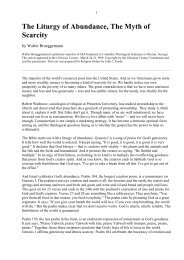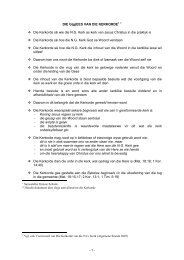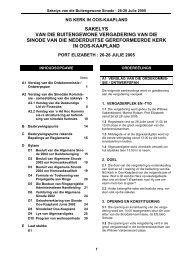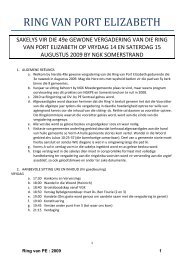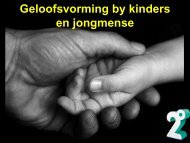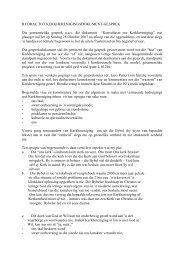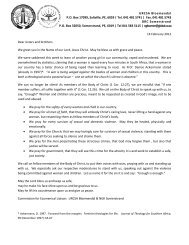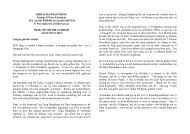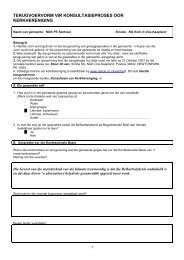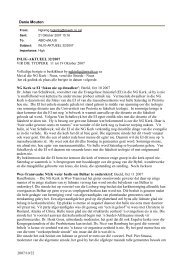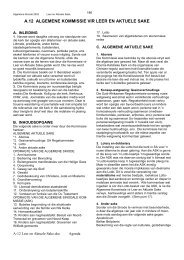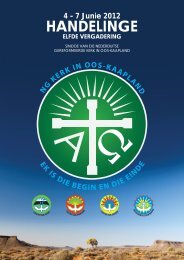You also want an ePaper? Increase the reach of your titles
YUMPU automatically turns print PDFs into web optimized ePapers that Google loves.
In their own <strong>in</strong>ternational relationships the churches are under pressure to adapt themselves to this system<br />
and to accept its values, which tend to overlook if not deny the spiritual dimension of human life. This<br />
therefore constitutes a serious threat to the <strong>in</strong>tegrity of the ecumenical movement, whose organizational<br />
forms represent a dist<strong>in</strong>ctly different model of relationships, based on solidarity and shar<strong>in</strong>g, mutual<br />
accountability and empowerment. On the threshold of the 21st century, all exist<strong>in</strong>g ecumenical structures<br />
must reassess themselves <strong>in</strong> the light of the challenge to manifest a form and quality of global community<br />
characterized by <strong>in</strong>clusiveness and reconciliation.<br />
2.10 An important affirmation made <strong>in</strong> the early phase of collaboration between the Roman Catholic Church<br />
and the World Council of Churches was that the two share <strong>in</strong> "one and the same ecumenical movement".<br />
This oneness of the ecumenical movement does not imply that there is a s<strong>in</strong>gle structure or a s<strong>in</strong>gle centre<br />
among the many different expressions of the movement. Nor does it suggest a normative understand<strong>in</strong>g<br />
which would become exclusive and thus contradict the very mean<strong>in</strong>g of ecumenical <strong>in</strong> the sense of<br />
"wholeness". The oneness of the ecumenical movement refers fundamentally to its orientation towards a<br />
"common call<strong>in</strong>g". Ultimately this is assured by the power of the Holy Spirit work<strong>in</strong>g <strong>in</strong> and through the<br />
manifold manifestations of the movement.<br />
2.11 The World Council of Churches shares with many other partners, <strong>in</strong>stitutionalized or not, the legacy of<br />
this one ecumenical movement and the responsibility to keep it alive. As the most comprehensive and<br />
representative body among the many organized expressions of the ecumenical movement, the World<br />
Council has the specific role of address<strong>in</strong>g the global ecumenical issues and act<strong>in</strong>g as a trustee for the<br />
<strong>in</strong>ner coherence of the movement.<br />
Chapter 3<br />
The Self-Understand<strong>in</strong>g of the World Council of Churches<br />
3.1 Any discussion of the WCC's self-understand<strong>in</strong>g must beg<strong>in</strong> with the constitutional Basis on which the<br />
WCC is founded, with which all member churches express agreement:<br />
The World Council of Churches is a fellowship of churches which confess the Lord Jesus Christ as God and<br />
Saviour accord<strong>in</strong>g to the Scriptures and therefore seek to fulfil together their common call<strong>in</strong>g to the glory of<br />
the one God, Father, Son and Holy Spirit.<br />
Two aspects of this statement are of central importance for articulat<strong>in</strong>g a renewed common understand<strong>in</strong>g<br />
of the WCC: (1) its characterization of the Council as a "fellowship of churches"; and (2) its emphasis on the<br />
"common call<strong>in</strong>g" which the churches seek to fulfil <strong>in</strong> and through the Council.<br />
A fellowship of churches<br />
3.2 The description of the WCC as a "fellowship of churches" <strong>in</strong>dicates clearly that the Council is not itself a<br />
church and - as the Toronto statement categorically declares - must never become a "superchurch".<br />
Moreover, s<strong>in</strong>ce the churches with<strong>in</strong> this fellowship themselves ma<strong>in</strong>ta<strong>in</strong> different conceptions of the<br />
church, their understand<strong>in</strong>g of the significance of this fellowship will also differ. This diversity was present at<br />
the WCC's First Assembly <strong>in</strong> 1948 and at the meet<strong>in</strong>g <strong>in</strong> 1950 of the WCC's Central Committee <strong>in</strong> Toronto,<br />
which produced the Council's fullest statement of self-def<strong>in</strong>ition. It cont<strong>in</strong>ues to exist after fifty years; <strong>in</strong>deed,<br />
further understand<strong>in</strong>gs have emerged as a result of life together. Nevertheless, the use of the term<br />
"fellowship" <strong>in</strong> the Basis does suggest that the Council is more than a mere functional association of<br />
churches set up to organize activities <strong>in</strong> areas of common <strong>in</strong>terest.<br />
3.3 While "fellowship" is sometimes used to translate the Greek word ko<strong>in</strong>onia, which is a key concept <strong>in</strong><br />
recent ecumenical discussion about the church and its unity, the relationship among the churches <strong>in</strong> the<br />
WCC as a whole is not yet ko<strong>in</strong>onia <strong>in</strong> the full sense (as described, for example, <strong>in</strong> the Canberra Assembly<br />
statement on "The Unity of the Church as Ko<strong>in</strong>onia: Gift and Call<strong>in</strong>g"). But the WCC Constitution (Art. 3,1)<br />
does portray the Council as a community of churches on the way to the "goal of visible unity <strong>in</strong> one faith<br />
and <strong>in</strong> one eucharistic fellowship expressed <strong>in</strong> worship and <strong>in</strong> common life <strong>in</strong> Christ, [seek<strong>in</strong>g] to advance<br />
towards that unity <strong>in</strong> order that the world may believe". To the extent that the member churches share the<br />
one baptism and the confession of Jesus Christ as God and Saviour, it can even be said (us<strong>in</strong>g the words<br />
of the Decree on Ecumenism of the Second Vatican Council) that a "real, even though imperfect<br />
communion" exists between them already now.<br />
3.4 The existence of the World Council of Churches as a fellowship of churches thus poses to its member<br />
churches what the Ecumenical Patriarchate has called an "ecclesiological challenge": to clarify the mean<strong>in</strong>g<br />
and the extent of the fellowship they experience <strong>in</strong> the Council, as well as the ecclesiological significance of<br />
ko<strong>in</strong>onia, which is the purpose and aim of the WCC but not yet a given reality.<br />
3.5 The follow<strong>in</strong>g affirmations may contribute to such a clarification:<br />
3.5.1 The mutual commitment which the churches have established with one another through the<br />
WCC is rooted <strong>in</strong> the recognition that they are related to one another thanks to actions of God <strong>in</strong> Jesus<br />
Christ which are prior to any decisions they may make. As the message from the Amsterdam Assembly put<br />
it, "Christ has made us his own, and he is not divided".<br />
ÏÓÎ



